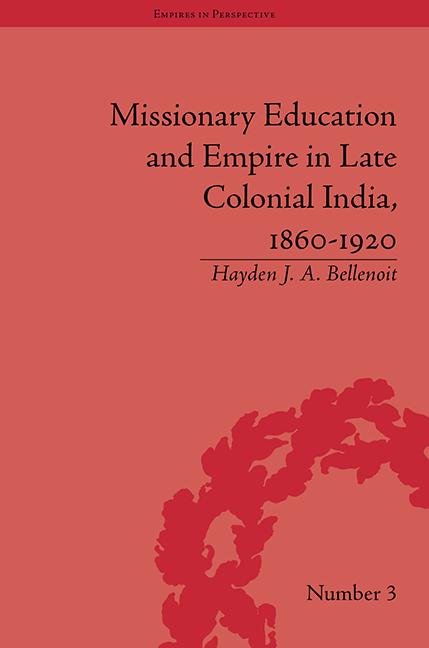Book contents
- Frontmatter
- CONTENTS
- List of Tables
- Acknowledgments
- Glossary
- List of Abbreviations
- Introduction
- 1 Knowledge, Religion and Education in Early Modern India
- 2 British Fears and Indian Society in the Emergence of North Indian Education, c. 1860–1920
- 3 Between East and West: Orientalism, Representations of and Engagements with India
- 4 The Failures of Education and its Sociological Bearings
- 5 Religious Interaction, the Curriculum and Indian Contestations of Late Colonial Knowledge
- 6 Maintaining Missionary Influence: Nationalism, Politics and the Raj c. 1870–1920
- Conclusion
- Notes
- Works Cited
- Index
4 - The Failures of Education and its Sociological Bearings
- Frontmatter
- CONTENTS
- List of Tables
- Acknowledgments
- Glossary
- List of Abbreviations
- Introduction
- 1 Knowledge, Religion and Education in Early Modern India
- 2 British Fears and Indian Society in the Emergence of North Indian Education, c. 1860–1920
- 3 Between East and West: Orientalism, Representations of and Engagements with India
- 4 The Failures of Education and its Sociological Bearings
- 5 Religious Interaction, the Curriculum and Indian Contestations of Late Colonial Knowledge
- 6 Maintaining Missionary Influence: Nationalism, Politics and the Raj c. 1870–1920
- Conclusion
- Notes
- Works Cited
- Index
Summary
So far this book has examined the wider contexts of emergent missionary education and the larger religious and social issues with which the educational enterprise had to deal. This chapter, by contrast, will analyse the specific – yet significant – workings of education. These were significant, for studies of colonial education and its purported ‘rupturing’ effects have, curiously, overlooked the infrastructures of pedagogy and their effectiveness in actually imparting knowledge. These were no less important than the larger role that institutions played. This chapter suggests that the massive institutional change in educational traditions enacted by the British introduction of western-style institutions and examinations did not necessarily mean that it was either completely disruptive or effective. The structure of education certainly seemed, on the surface, dominating and restrictive, rendering the traditional tol, gurukul and pathshala obsolete. Yet upon closer inspection, colonial education itself rested upon a tenuous and shaky infrastructure. The very conducive atmospheres which were to give mission schools their religious character were as elusive as the converts for which their benefactors hoped. Ironically, mission schools had to come to terms with pressures emanating from the very bureaucratic and institutional superstructures which were their lifeline. A more careful and empirical analysis of institutional education, this chapter argues, reveals that it was inimical to both religiosity and, at times, general spirituality. The very infrastructure built up by both Indians and Europeans also ensured that it would reproduce particular Indian social ethoses, norms and values which would colour the emergence of Indian patriotism.
Compromised Aims: Missionary Finances and Government Dependency
Missionary educationists had their religious and evangelical activities constrained in a myriad of ways. One of the most important was in relation to finance. This was intricately related not only to the composition of their student and teacher bodies, but also to their reliance upon Government for financial backing. Missionary dependence upon state funds as a means of subsidization hindered the aims of mission schools from the onset. This was due to the very infrastructure they built up. As one north Indian missionary from the CMS remarked: ‘the whole question [of education] is a financial one’.
- Type
- Chapter
- Information
- Publisher: Pickering & ChattoFirst published in: 2014



